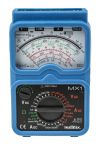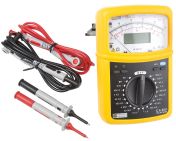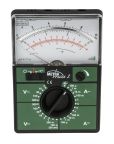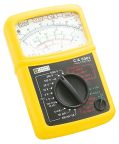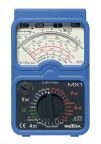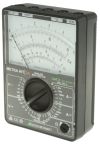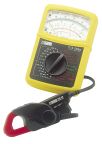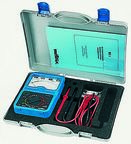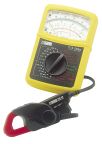Analogue Multimeters
Analogue Multimeters are versatile electrical measurement tools used by engineers, electricians, and hobbyists to measure several key electrical parameters which include:
- Voltage - both direct current (DC) and alternating current (AC) voltages
- Current - both DC and AC currents
- Resistance - measures resistance in ohms. This is particularly useful for testing the resistance of components such as resistors, conductors, and other elements within an electrical circuit.
- Continuity - Many analogue multimeters include a continuity test feature. This feature emits an audible beep or provides a visual indication when a circuit is continuous (no breaks or gaps in the connection), helping to identify open circuits.
- Diode Testing - allowing users to check the functionality of diodes and determine their forward and reverse bias.
- Capacitance and Frequency - providing insight into the storage capability of capacitors and frequency, enabling users to assess the oscillation rate of electrical signals.
Features and Benefits of Analogue Multimeters:
- Precision Measurement - provide precise and real-time measurements of voltage, current, and resistance. The analog needle movements offer a fluid representation of changing values, allowing users to swiftly identify fluctuations.
- Durability - designed to withstand the rigors of demanding work environments.
- Simplicity and Intuitiveness - The analogue display provides an intuitive representation of measurement readings, enabling users to swiftly interpret changes in electrical parameters.
- Immediate Response to Fluctuations - respond instantaneously to changes in electrical parameters, providing real-time insights into variations.
- No Power Dependency - ensures that they can be employed even in situations where a power source might be unavailable.
What is the difference between an analogue and digital multimeter (DMM)?
- Display Type - Analogue Multimeters employ a needle movement across a scale whereas digital multimeters display numerical values digitally
- Resolution - Digital Multimeters typically have higher resolution, making them suitable for intricate measurements requiring precise numerical data.
- Speed - Analogue Multimeters respond more rapidly to fluctuations, but Digital Multimeters offer faster measurement processing and display.
- Complexity - DMMs can measure a broader range of electrical parameters and often include additional features like auto-ranging and data logging, making them more versatile in complex applications.
17 Products showing for Analogue Multimeters
Results per page
Popular Searches
Related links
- Multimeter Kits
- Fluke 115 Handheld Digital Multimeter 10A ac Max 600V ac Max
- Multimeter Leads
- Digital Multimeters and How to Use Them
- Fluke 179 Handheld Digital Multimeter 10A ac Max 1000V ac Max
- Multimeter Fuses
- Fluke 117 Handheld Digital Multimeter 10A ac Max 600V ac Max
- Fluke IR Connector for Use with Fluke 189 Digital Multimeter Fluke 289 Digital
